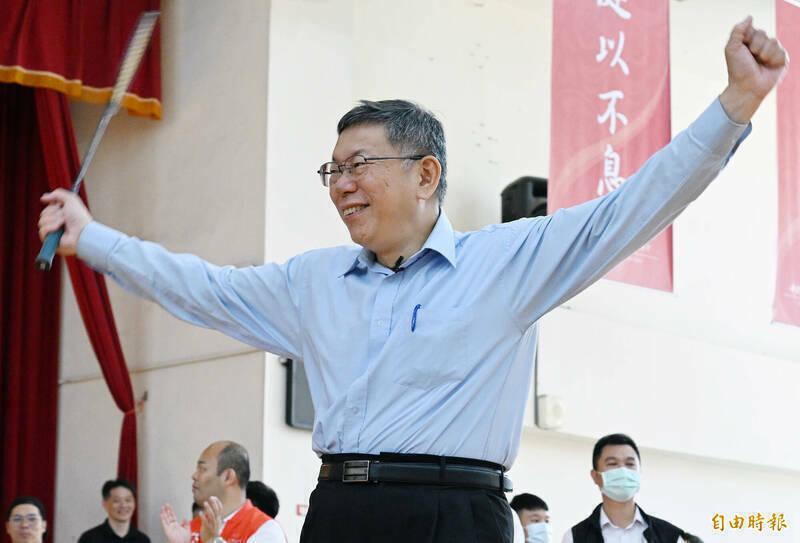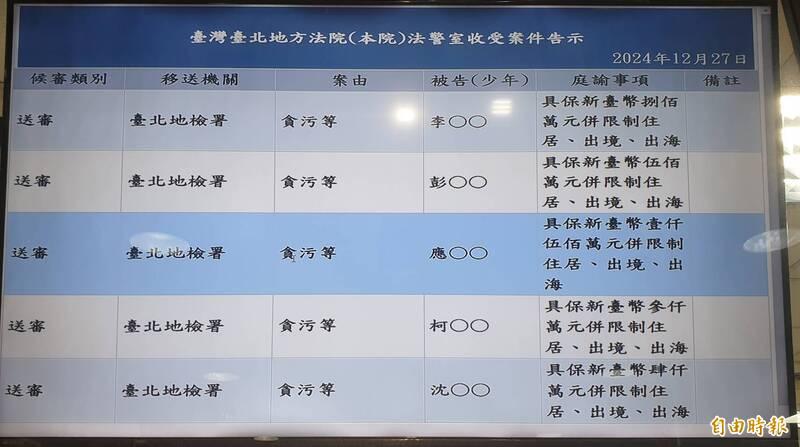The Taipei District Court this morning rejected a request from prosecutors to extend the incommunicado detention of Taiwan People's Party (TPP) Chairman Ko Wen-je (柯文哲) after Ko was indicted on charges of bribery and other forms of corruption yesterday, with prosecutors seeking a total sentence of 28.5 years for the former Taipei mayor.
According to today's ruling, Ko would be released on bail of NT$30 million (US$917,431) and be barred from changing his residence and going abroad.
The Taipei District Prosecutors Office said it would appeal the ruling.

Photo: Taipei Times file photo
Ko has been held incommunicado since Sept. 5. His detention was extended in October over allegations of bribery and corruption linked to real estate dealings during his second term as Taipei mayor from 2018 to 2022.
He was also charged with embezzling political donations made to the TPP during the presidential election this January.
The court also rejected prosecutors' requests to detain other defendants in the case, including former Taipei Deputy Mayor Pong Cheng-sheng (彭振聲), Taipei City Councilor Ying Hsiao-wei (應曉薇), Lee Wen-tsung (李文宗), finance chief of Ko's 2024 election campaign office; and Sheen Ching-jing (沈慶京), founder and chairman of the real estate conglomerate Core Pacific Group.

Photo: Yang Kuo-wen, Taipei Times
Pong can be released on bail of NT$5 million and Ying on bail of NT$15 million. Lee can be released on bail of NT$10 million and Sheen on bail of NT$40 million, the court said.
According to the court, they would also be prohibited from changing residence and leaving the country.
While prosecutors said Hsu Chih-yu (許芷瑜), another defendant, who served as a close aide to Ko, had fled overseas, they failed to established clear evidence to show she was involved in the case.
Prosecutors noted that as related witnesses have been summoned for questioning, the risk of the investigations being undermined was low.
The TTP yesterday condemned Ko's indictment, accusing the ruling Democratic Progressive Party (DPP) of political persecution and attempting to silence the 3.69 million Taiwanese who voted for Ko in January’s presidential election.

The combined effect of the monsoon, the outer rim of Typhoon Fengshen and a low-pressure system is expected to bring significant rainfall this week to various parts of the nation, the Central Weather Administration (CWA) said. The heaviest rain is expected to occur today and tomorrow, with torrential rain expected in Keelung’s north coast, Yilan and the mountainous regions of Taipei and New Taipei City, the CWA said. Rivers could rise rapidly, and residents should stay away from riverbanks and avoid going to the mountains or engaging in water activities, it said. Scattered showers are expected today in central and

COOPERATION: Taiwan is aligning closely with US strategic objectives on various matters, including China’s rare earths restrictions, the Ministry of Foreign Affairs said Taiwan could deal with China’s tightened export controls on rare earth metals by turning to “urban mining,” a researcher said yesterday. Rare earth metals, which are used in semiconductors and other electronic components, could be recovered from industrial or electronic waste to reduce reliance on imports, National Cheng Kung University Department of Resources Engineering professor Lee Cheng-han (李政翰) said. Despite their name, rare earth elements are not actually rare — their abundance in the Earth’s crust is relatively high, but they are dispersed, making extraction and refining energy-intensive and environmentally damaging, he said, adding that many countries have opted to

SUPPLY CHAIN: Taiwan’s advantages in the drone industry include rapid production capacity that is independent of Chinese-made parts, the economic ministry said The Executive Yuan yesterday approved plans to invest NT$44.2 billion (US$1.44 billion) into domestic production of uncrewed aerial vehicles over the next six years, bringing Taiwan’s output value to more than NT$40 billion by 2030 and making the nation Asia’s democratic hub for the drone supply chain. The proposed budget has NT$33.8 billion in new allocations and NT$10.43 billion in existing funds, the Ministry of Economic Affairs said. Under the new development program, the public sector would purchase nearly 100,000 drones, of which 50,898 would be for civil and government use, while 48,750 would be for national defense, it said. The Ministry of

UNITED: The other candidates congratulated Cheng on her win, saying they hoped the new chair could bring the party to victory in the elections next year and in 2028 Former Chinese Nationalist Party (KMT) lawmaker Cheng Li-wun (鄭麗文) yesterday won the party’s chair election with 65,122 votes, or 50.15 percent of the votes. It was the first time Cheng, 55, ran for the top KMT post, and she is the second woman to hold the post of chair, following Hung Hsiu-chu (洪秀柱), who served from 2016 to 2017. Cheng is to succeed incumbent Eric Chu (朱立倫) on Nov. 1 for a four-year term. Cheng said she has spoken with the other five candidates and pledged to maintain party unity, adding that the party would aim to win the elections next year and